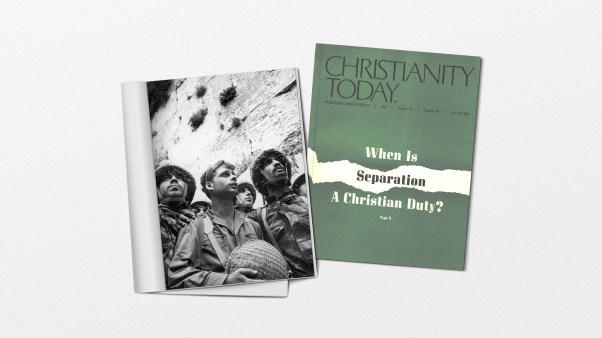Last December, two Muslim college students visited an upstate New York megachurch as part of an assignment to learn about different faiths. After the service, some congregants shared stories and offered hugs. One called Homeland Security.
The incident was an anomaly. But it still made national news, because it played into stereotypes of American evangelicals’ unfamiliarity with Muslims and tendency to conflate Islam with terrorism.
Surveys suggest that what evangelicals think Muslims think is quite different from how Muslims in the United States and abroad describe their beliefs. White evangelicals are also the least likely Americans to know a Muslim.
This concerns evangelical experts on Muslim missions. Because as more Muslim migrants flee unstable and violent homelands, the mission field that was once half a world away has made its way into many American communities. Last year, the US admitted about 39,000 Muslim refugees, a record high.
“This is the best chance we’ve had in human history to share the love of Christ with Muslims,” said David Cashin, an intercultural studies professor at Columbia International University.
But survey after survey indicates that white evangelicals are the least excited about their new neighbors. They show the highest levels of support for restrictions on Muslim immigration and the most skepticism toward Muslim Americans.
Case in point: President Donald Trump’s revised executive order on travel, which temporarily halts the refugee program and restricts entry from several Muslim-majority countries. Self-identified white evangelicals support the policy by a 3 to 1 margin (Pew Research Center) and are the only religious group in America that has grown more supportive of banning Muslims from America (PRRI). During the election, outspoken leader Franklin Graham even emphasized on Facebook that he came up with the idea well before Trump did.
“Because of these attitudes,” Cashin said, “we could miss the opportunity.”
Much of the fear among evangelicals “is because people do not know Muslims,” said Michael Urton, associate director of the COMMA Network (Coalition of Ministries to Muslims in North America). “They do not know what Muslims believe, and they feel overwhelmed. It creates this paralysis.”
Pew has found that about 70 percent of self-identified white evangelicals are “very concerned” about Islamic extremism in the US, and about 50 percent believe that there is a “great deal” or “fair amount” of support for extremism among Muslims living in America.
“We don’t want to be naïve and pretend that terrorism isn’t a problem, but we don’t want to be alarmist and assume that Muslims are all terrorists,” Urton said. “Many are victims of terrorism, and they don’t want to see their sons and daughters killed.”
Muslims now make up about 1 percent of the US population with an estimated 3.3 million people. White evangelicals, along with fellow Christians, remain concerned about how Muslim faith and culture fit with the American way of life, and doubt that immigrants and refugees can assimilate.
“It has to do with the fact that the evangelical church is in touch with Christian churches in the Muslim world. More than any other religious group, they’re hearing the horror stories,” said Cashin, who himself has had three friends and colleagues martyred attempting to take the gospel to Muslim nations.
According to a PRRI poll conducted last year, 74 percent of white evangelicals, 66 percent of white mainline Protestants, and 63 percent of white Catholics said they saw Islamic and American values in conflict.
“That assumes that human beings can’t change, which is not a biblical value,” Cashin said. “If you want Muslims to assimilate, you better be out there showing them the love of Christ. If you want to reject them, they’ll form ghettos.”
While most American evangelicals worry about the application of Shari‘ah law in the US, according to a 2015 LifeWay Research poll, Muslims do not favor it. The latest American Muslim Poll from the Institute for Social Policy and Understanding found that 55 percent opposed the use of Shari‘ah as a legal source, while 10 percent said it should play a role.
Though Muslim Americans are growing in number and prominence, a majority of white evangelicals do not know a single one. In a Pew survey released this year, just over a third (35%) say they have a personal connection to a Muslim.
Many associate the violent acts of ISIS extremists, who target Christians and other religious minorities, with Islam itself. In a LifeWay survey, slightly more than half of evangelical pastors saw ISIS as a true indication of what Islamic society looks like.
Warren Larson, former director of the Zwemer Center for Muslim Studies, called such beliefs “very damaging for ministry and mission among Muslims.” After 9/11, “quite a few evangelical books came out warning Christians to steer clear of Islam. Fear of Muslims grew substantially,” he said. “I felt such Christian writings often lacked solid research and were deficient in helping fellow believers reach out to Muslims with love and understanding.”
According to the Arab Barometer Survey, a majority of Muslims across 10 countries said they’d be comfortable with neighbors of a different religion and supported their right to practice their faith. In Iraq—where Christians have been expelled by ISIS—82 percent of Muslims were comfortable with non-Muslim neighbors.
“While knowledge about Christianity is low, tolerance of non-Muslims is high across the Arab world,” said Michael Hoffman, of Georgetown University’s Religious Freedom Project.
Though the polls reveal that white evangelicals are very concerned about Muslims’ impact on American security and values, many top US evangelical leaders are preaching a different message. Last month, prominent pastors signed a letter along with 500 evangelical figures opposing Trump’s travel ban.
“Would a Muslim feel the American church is a safe place for them? The answer probably is they would not,” Cashin said. The more evangelicals come out in favor of Trump’s policies, he said, the more they exclusively view Islam as a threat rather than a ministry opportunity. For him, it’s both—and mission takes priority.
Islamic rule has led to unrest, violence, and spiritual hunger across the Middle East, and Christians should be willing to critique its ideology, he said. At the same time, that doesn’t make Muslims a danger to avoid, but a group for churches to open their doors to with welcoming services, community dinners, and English classes.
“This is a moment Christian missionaries to the Muslim world have dreamed about for centuries.”
Kate Shellnutt is online associate editor at CT.
Editor’s note: An earlier version of this story was published online on March 20.








